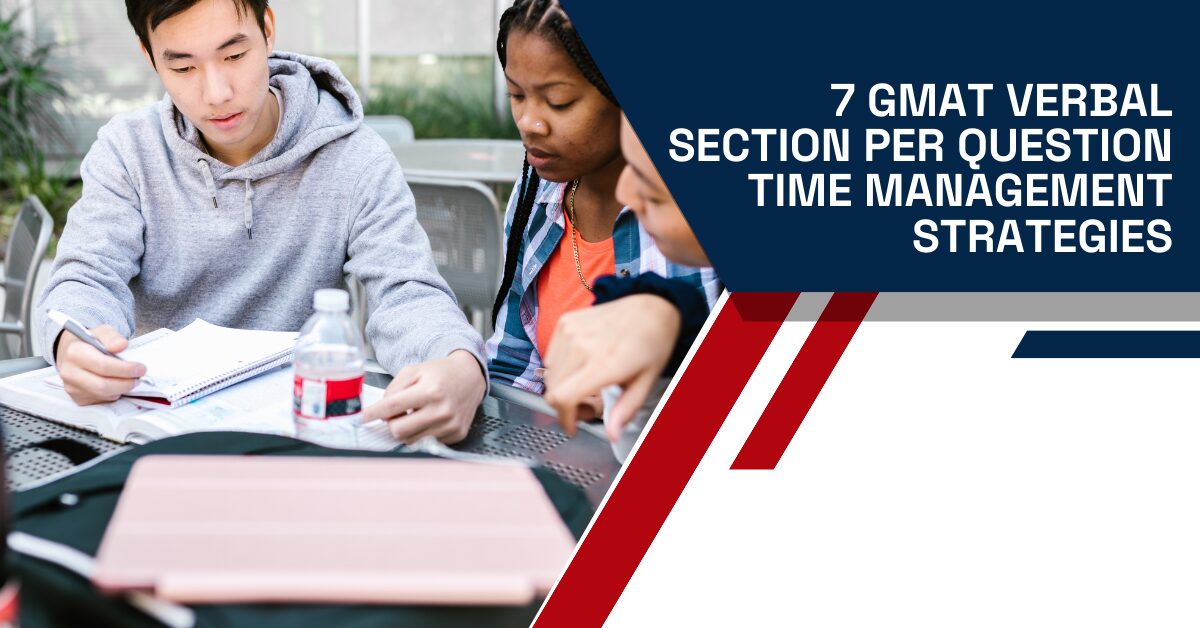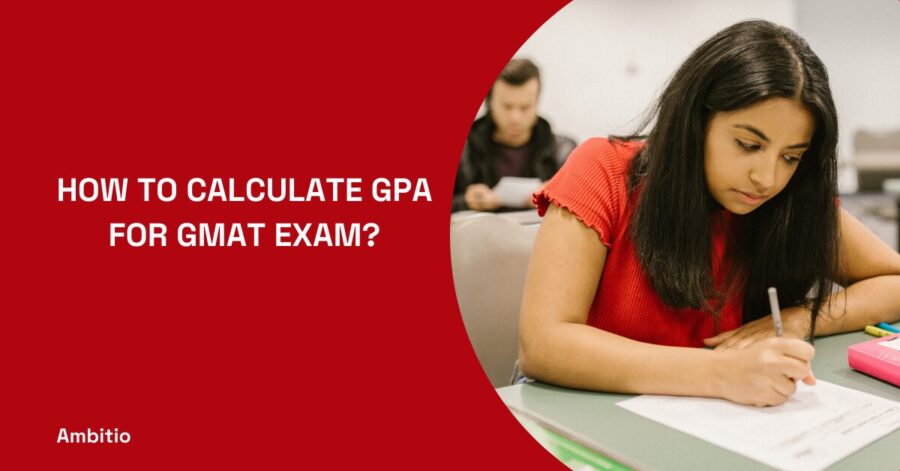16 December 2024
8 minutes read
7 GMAT Verbal Section Per Question Time Management Strategies

Key Takeaways
- Effective time management is crucial for GMAT Verbal success, with an ideal pace of about 2 minutes per question.
- Strategic approaches like prioritizing easier questions and using the 1-minute rule can help maximize your score.
- Regular practice under simulated test conditions is essential for developing strong pacing and time management skills.
Did you know that the GMAT Verbal Section is designed to test not only your language skills but also your ability to manage time effectively? Many test-takers often find themselves struggling to complete the verbal section within the allotted time, leading to a significant number of unanswered questions and a lower score.
Managing your time during the GMAT verbal section can feel like a race against the clock. It’s common for test-takers to run out of time or spend too many minutes per question, especially on challenging critical reasoning questions. This often results in rushing through the last few questions, leading to incorrect answers. However, with the right GMAT time management strategies, you can turn this around and improve your performance on test day.
However, we have covered everything you need to know about GMAT verbal questions and time management.
What Is The GMAT Verbal Section
The GMAT Verbal Section is a crucial component of the GMAT exam, designed to test your ability to read and comprehend written material, reason and evaluate arguments, and correct written material to conform to standard written English. During your core GMAT prep, understanding the structure of this section is essential to effectively manage your time and maximize your GMAT score.

In the Verbal Section, you’ll encounter different questions, including reading comprehension, sentence correction, and the ever-challenging critical reasoning question. Each question type requires a unique approach and an average time to answer, typically around two minutes per question. However, some difficult questions may require extra time, making time management even more critical.
Here are key aspects of the GMAT verbal section:
| Aspect | Details |
|---|---|
| Question Types | Reading Comprehension, Sentence Correction, Critical Reasoning |
| Average Time per Question | Approximately 2 minutes |
| Time Management | Develop strategies to allocate appropriate time per question, ensuring time at the end for review. Create a successful GMAT study plan. |
| Key Focus Areas | Understanding and evaluating written material, reasoning and argumentation, correcting written English |
| Practice Strategies | Use full-length practice tests, and practice questions to simulate real test conditions and handle time constraints |
| Common Challenges | Managing time efficiently, dealing with difficult questions, avoiding rushing through the last questions |
| Preparation Tips | Regular GMAT verbal preparation, practice managing time reading passages, and reasoning through arguments |
| Importance of Practice | Consistent practice helps improve time management, and familiarity with question types and reduces the likelihood of incorrect answers under time pressure |
How To Understand GMAT Verbal Section Structure?
The verbal sections of the GMAT assesses your ability to read and comprehend written material, reason and evaluate arguments, and correct written material to conform to standard written English. Let’s delve into the specific subsections that make up the Verbal Section, which includes 23 verbal questions.
Reading Comprehension
In this subsection, you’ll encounter passages covering a range of topics, including social sciences, natural sciences, and business-related subjects. Throughout the verbal section, your task is to read the passage and answer questions that test your understanding, inference, and ability to analyze the text. Kaplan Test Prep suggests a methodical pace throughout the verbal section to avoid spending too much time on one passage and ensure you have enough time to answer all questions. Effective time management on the GMAT is important to avoid timing issues.
Critical Reasoning
Critical Reasoning questions are designed to test your ability to evaluate arguments. You’ll be presented with a short argument and asked to strengthen, weaken, or find assumptions in the argument. This requires a logical and methodical approach, as well as careful reading to avoid incorrect answers. Many GMAT test-takers often run out of time, so it’s essential to have a pacing strategy. Using the time wisely and understanding how much time has passed can help in managing your time throughout the verbal section.
Sentence Correction
Sentence Correction questions test your ability to identify and correct grammatical errors in sentences. This subsection focuses on standard written English and includes questions on grammar, syntax, and sentence structure. Each question presents a sentence with an underlined portion, and your task is to select the best option that corrects the error, if there is one. To score good on the GMAT, particularly in the verbal section, practicing with different timing strategies can help you catch up on time and avoid spending too much time on any single question.
7 GMAT Exam Verbal Section Time Management Strategies Per Question
Effective time management on the GMAT is essential to ensure that you can answer all the questions within the allotted time. Many GMAT test-takers often run out of time in this section, but with the right strategies, you can take control of your test and achieve a high score on the GMAT. Here are seven time management strategies specifically for the verbal section of the GMAT.

1. Set Pacing Benchmarks
Establish clear verbal timing benchmarks to pace yourself throughout the verbal section. For instance, aim to complete each question in approximately 2 minutes. This consistent pacing ensures you don’t spend too much time on any single question, helping you finish the section on time.
2. Prioritize Easier Questions First
As you navigate the verbal section, answer the questions you find easiest first. This strategy allows you to secure quick points and builds confidence, saving more complex questions for later when you might have extra time. This also helps in avoiding the trap of spending too much time on difficult questions early on.
3. Implement the 1-Minute Rule
For each question, if you can’t confidently answer within the first minute, mark it and move on. The GMAT verbal scoring algorithm “knows” your pacing, so don’t waste time struggling. Return to these marked questions later if you have remaining time at the end of the section. This prevents you from getting stuck and ensures you attempt all questions.
4. Use Strategic Skipping
Strategically skip questions that seem particularly time-consuming or confusing. Kaplan Test Prep suggests that skipping difficult questions initially and revisiting them later can help maintain a steady flow. This approach ensures that you don’t run out of time and can give yourself the opportunity to answer more questions correctly.
5. Monitor Time Regularly
Keep an eye on the clock throughout the verbal section. Check how much time has passed and how much you have left after every five questions. This regular monitoring helps you stay on track and avoid unexpected time crunches. Effective time management on the GMAT new format involves being constantly aware of your pacing.
6. Employ the Process of Elimination
When faced with a tough question, use the process of elimination to narrow down your choices. This strategy increases your chances of selecting the correct answer even if you’re unsure. Spending extra time on the first step of eliminating obviously incorrect answers can save time in the long run and help you answer questions more efficiently.
7. Simulate Test Conditions
Practice under test conditions by taking full-length practice tests. The GMAT Focus Edition emphasizes the importance of simulating real test environments to get used to the timing pressures. This practice helps you develop a rhythm and understand how to pace yourself, ensuring you can handle the time constraints effectively on test day.
Common Time Management Problems Students Face In GMAT Verbal Section
Many test-takers struggle to pace themselves effectively throughout the verbal section, leading to rushed answers or incomplete sections by the end of the test. One of the main issues is spending too much time on the initial questions, which can eat into the time needed for the rest of the test. It’s crucial to implement effective pacing strategies to ensure a steady and methodical pace throughout the verbal section.
Spending Too Much Time on Early Questions
Many test-takers spend over 3 minutes on the initial questions, believing they are more critical. This misconception often leads to a time crunch later in the section. The GMAT algorithm “knows” your pacing, so it’s important not to waste precious minutes early on. Instead, maintain a consistent pace of about 2 minutes per question to ensure you have enough time for all questions.
Inconsistent Pacing and Panicking
Inconsistent pacing is another significant problem. Many test-takers start at a steady pace but panic when they realize they are falling behind. A survey in GMAT circles showed that 35% of students rush through the last 10 questions due to poor time management earlier in the section. Implementing effective pacing strategies, such as setting mini-deadlines within the section, can help you avoid this pitfall.
Mismanagement of Remaining Time
Keeping track of how much time has passed and how much remaining time you have is essential yet challenging. Data from the GMAT Focus Edition indicates that about 50% of test-takers lose track of time during the verbal section, resulting in either spending too much time on certain questions or not having enough time to review their answers at the end of the section. Regularly checking the clock after every set of five questions can help maintain a balanced pace.
Over-Allocation of Time to Harder Questions
Many test-takers fall into the trap of spending extra time on harder questions, thinking that these will significantly impact their score. However, this strategy can backfire. According to a Kaplan Test Prep analysis, spending more than 3 minutes on particularly challenging questions often does not lead to correct answers and results in less time for easier questions. A different timing strategy, such as allocating a strict 2-minute limit per question and moving on if you exceed it, can be more effective.
Ineffective Review Strategies
Not leaving enough time at the end of the section to review answers is a common mistake. Kaplan Test Prep found that students who allocate at least 5 minutes at the end of the verbal section for review tend to score higher. This time can be used to catch and correct any mistakes, but it requires efficient pacing throughout the verbal section to ensure you have this review period available.
Misjudging the Difficulty of Questions
Misjudging the difficulty of questions and spending too much time trying to get the right answer on supposedly easy questions is another issue. The GMAT is designed to test your ability to manage your time and mental energy. Practicing with full-length practice tests can help you get a better sense of which questions require more time and which ones can be answered quickly.
Conclusion
At last, we would say – GMAT Verbal timing isn’t just about speed—it’s about strategy. By setting clear benchmarks and knowing when to move on, you’ll avoid the common trap of getting bogged down. Remember, every question counts equally, so don’t sacrifice your overall performance for one tough problem.
we would suggest practice smart, stay aware of your pacing, and you’ll find yourself breezing through the section with confidence. In the end, it’s not just about answering questions—it’s about managing your most valuable resource: time.
Empower your GMAT journey with Ambitio’s expert strategies and resources. Our platform is designed to guide you to exceptional results, offering a blend of content mastery, practice opportunities, and analytical techniques that elevate your preparation and performance.
FAQs
How Do I Register for the GMAT?
You can register for the GMAT at mba.com, the official GMAT website. After creating an account, you can select your testing date, time, and location by clicking on “Register for the GMAT” under “The GMAT Exam” on the main page. You can also register by phone, but there is a $10 phone service fee.
How Much Does the GMAT Cost?
How Often Can I Take the GMAT?
Can I Reschedule a GMAT Appointment?
How Should I Prepare for the GMAT?
Where Can I Find Prep Material for the GMAT?

You can study at top universities worldwide!
Get expert tips and tricks to get into top universities with a free expert session.
Book Your Free 30-Minute Session Now! Book a call now




























